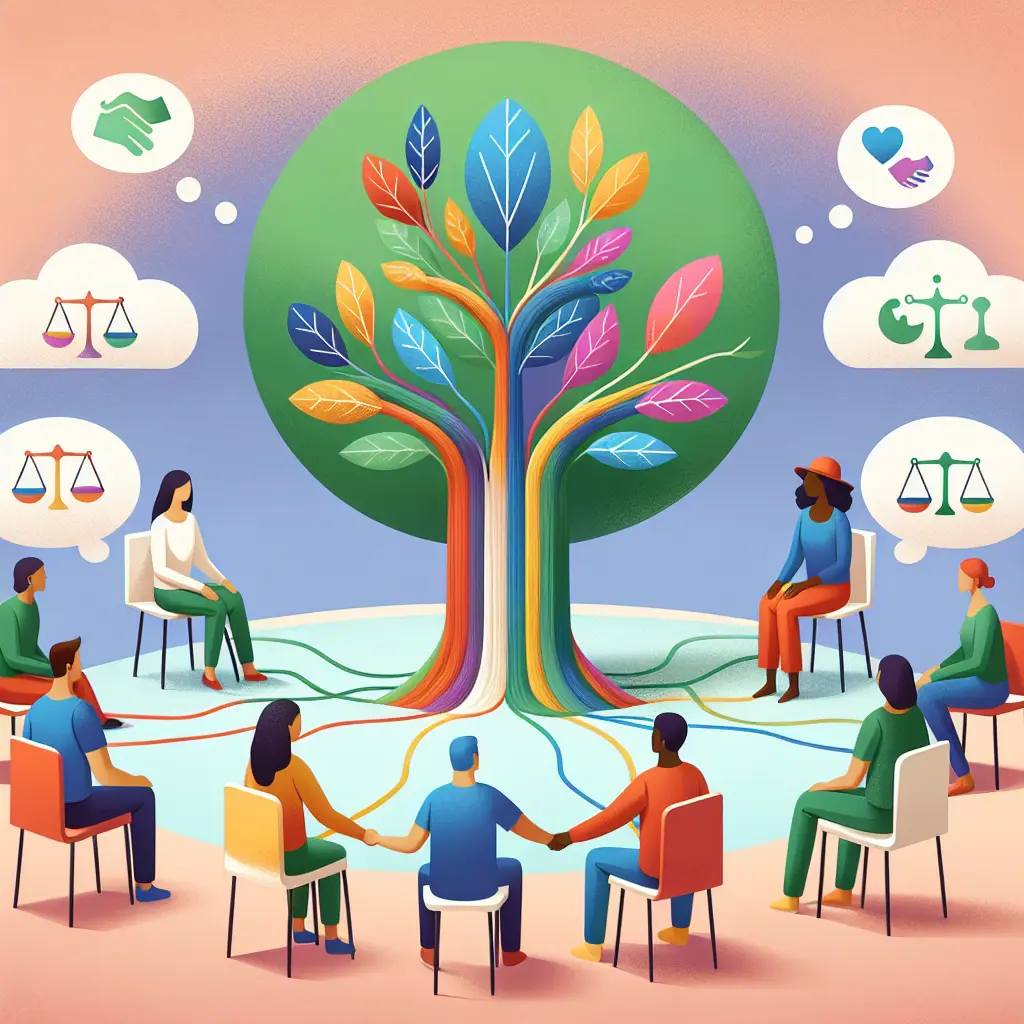
In today's fast-paced world, maintaining healthy family relationships is more important than ever. With increasing conflicts and communication barriers, families seek effective methods to strengthen their bonds. Restorative justice offers a transformative approach to conflict resolution, providing families with a framework to heal conflicts and rebuild trust. This article explores how restorative justice practices can be seamlessly integrated into everyday family life to foster enduring connections and create a more harmonious living environment.
Understanding Restorative Justice and Its Benefits
Restorative justice is a method of conflict resolution that emphasizes empathy, accountability, and open communication. Central to this approach are practices such as restorative circles and family mediation sessions, which provide a supportive environment for family members to express their feelings. This encourages open dialogue, fostering a deeper understanding that can lead to lasting reconciliation and improved family dynamics.
The Role of Restorative Circles in Family Mediation
Restorative circles offer a safe space for family members to discuss issues openly and honestly. Through guided conversations, participants can share their experiences and emotions, promoting empathy and understanding. This practice is instrumental in healing family conflicts and rebuilding trust. A recent study highlights the success of these circles in educational settings, particularly among marginalized communities like Aboriginal children. Read more about Aboriginal children's education.
Case Studies and Data Supporting Restorative Practices
Aboriginal Children's Education and Restorative Justice
Reports indicate that Aboriginal children in Australia face significant challenges in education, including high suspension rates. Integrating restorative justice techniques in schools has shown promise in addressing these issues by reducing suspensions and fostering inclusive school environments. Learn how restorative practices benefit Aboriginal students.
The Black Panthers' Influence on Educational Reform
The Black Panthers' legacy in reshaping U.S. education emphasizes community involvement and empowerment through education, aligning with restorative justice principles. Their model for community schools demonstrates how restorative practices can benefit not only schools but also family relationships by promoting community engagement and support. Explore the Black Panthers' impact on education.
Implementing Restorative Justice Techniques in Families
Building Communication Skills
Effective communication is crucial for healthy family relationships. Restorative justice programs provide tools and strategies that help families nurture their communication skills. By encouraging active listening and empathetic dialogue, families can improve their communication and support systems, leading to stronger bonds.
Rebuilding Trust Through Accountability
Accountability is a cornerstone of restorative justice. Families adopting these techniques focus on acknowledging harm and taking responsibility for actions, facilitating healing and rebuilding trust. This approach creates a solid foundation for future interactions.
Addressing Wider Societal Implications
Public Inquiries and Validating Survivor Experiences
Restorative justice extends beyond families to address societal issues, such as validating survivor experiences through public inquiries. These inquiries play a critical role in acknowledging harm and fostering healing on a broader scale. Read more about public inquiries and their impact.
The Impact of Suspension Policies on Minority Students
Data shows that out-of-school suspensions disproportionately affect minority students, hindering their educational progress. Some U.S. schools are shifting from punitive measures to restorative approaches, which have proven more effective in improving student outcomes and reducing racial disparities. Discover the benefits of restorative approaches in schools.
Challenges and Future Directions
While restorative justice offers significant benefits for strengthening family relationships, its implementation presents challenges. It requires commitment from all family members and can be resource-intensive. However, the long-term benefits of improved family dynamics make it a worthwhile investment.
Expanding Restorative Justice Programs
To maximize the impact of restorative justice in families, expanding these programs within communities is crucial. Collaborating with local organizations, schools, and support services can enhance accessibility and effectiveness, ensuring families benefit from comprehensive support systems promoting lasting reconciliation and harmony.
Conclusion: Cultivating Resilient Family Connections through Restorative Justice
Restorative justice offers a transformative framework for enhancing family relationships by focusing on empathy, accountability, and open communication. These practices have the potential to heal conflicts and strengthen bonds within families.
Understanding and Implementing Restorative Practices: By incorporating restorative circles and family mediation, families can create safe spaces for open dialogue, fostering empathy and understanding crucial in resolving conflicts.
Communication and Accountability: Emphasizing the importance of communication skills and accountability leads to healthier dynamics and deeper connections.
Societal Implications: Beyond individual families, restorative justice addresses educational disparities and validates survivor experiences through public inquiries.
Challenges and Expansion: Despite being resource-intensive, the benefits make it worthwhile, and expanding these programs through community collaboration is essential.
In conclusion, restorative justice is not merely reactive but proactive, empowering families to foster harmonious environments. By embracing these practices, families can transform strained relationships into resilient connections, ensuring enduring bonds. Reflect on these insights and consider how restorative justice could benefit your family dynamics. I invite you to share your experiences or thoughts in the comments below—your stories are invaluable as we explore the potential of restorative justice in strengthening family ties.
Thank you for joining me on this journey toward understanding and implementing restorative justice for a harmonious family life. May your family relationships flourish with empathy and trust.
Author: Clara Reynolds
For further reading on applying restorative justice in various contexts, explore Restorative Justice: A Transformative Approach and Family Mediation Resources.